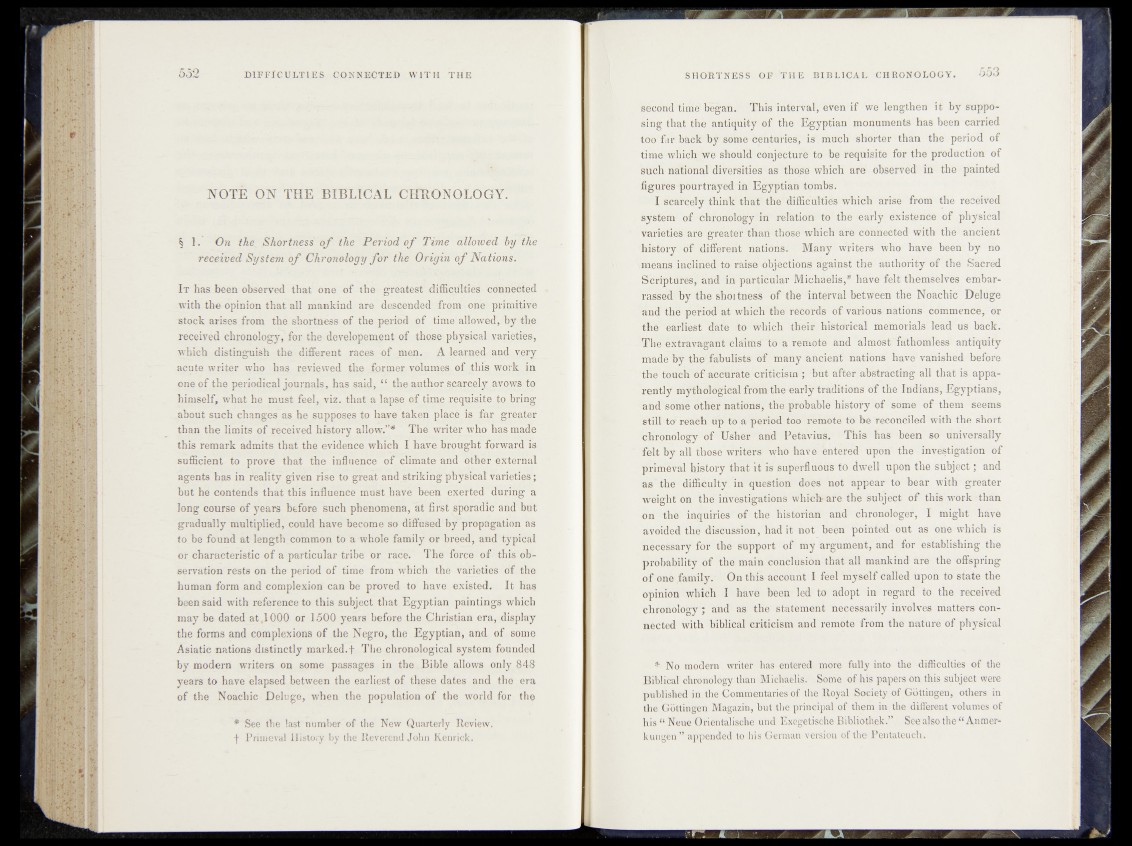
532 DIFFICULTIES CONNECTED WITH THE
NOTE ON THE BIBLICAL CHRONOLOGY.
§ 1. On the. Shortness o f the Period o f Time allowed by the
received System o f Chronology fo r the Origin o f Nations.
I t has been observed that one of the greatest difficulties connected
with -the opinion that all mankind are descended from one primitive
stock arises from the shortness of the period of time allowed, by the
received chronology/ for the developement of those physical varieties,
Which distinguish the different races of men. A learned and very
acute writer who has reviewed the former volumes of this work in
one of the periodical journals, has said, “ the author scarcely avows to
himself, what he must feel, viz. that a lapse of time requisite to bring
about such changes as he supposes to have taken placé is far greater
than the limits of received history allow.”'* The writer who has made
this remark admits that the evidence which I have brought forward is
sufficient to prove that the influence of climate and other external
agents has in reality given rise to great and striking physical varieties ;
but he contends that this influence must have been exerted during a
long course of years before such phenomena, at first sporadic and but
gradually multiplied, could have become so diffused by propagation as
to be found at length common to a whole family or breed, and typical
or characteristic of a particular tribe or race. The force of this observation
rests on the period of time from which the varieties of the
human form and complexion can be proved to have existed. It has
been said with reference to this subject that Egyptian paintings which
may be dated at,1000 or 1500 years before the Christian era, display
the forms and complexions of the Negro, the Egyptian, and of some
Asiatic nations distinctly marked.f The chronological system founded
by modern writers on some passages in the. Bible allows only 848
years to have elapsed between the earliest of these dates and the era
of the Noaehic Deluge, when the population of the world for the
* See the last number of the New Quarterly Review.
f Primeval History by the Reverend John Kenrick.
SHORTNESS OF THE BIB LICAL CHRONOLOGY. 55 3
second time began. This interval, even if we lengthen it by supposing
that the antiquity of the Egyptian monuments has been carried
too far back by some centuries, is much shorter than the period of
time which we should conjecture to be requisite for the production of
fefeh national diversities'as thn^se which arë observed in thé painted
figures pourtrayed in Egyptian tombs.
I sc&feqely think that the difficulties which arise from thé' reééxVed
system of chronology in relation to thè-eariy existence of physical
varieties are greater than thóse which are connected with the ancient
history of different nations. Many writers who have been by no
means inclined to raise objections against the authority of the Sacred
Scriptures,- and in particular Michael is,* have felt themselves embarrassed
by the shoitness of the interval between thé Noachic Deluge
and the period at Which the records of various nations commence, or
thè1 earliest date to which their historical memorials lead us back.
ThéL^tré^aganV claims' to 'a remote and almost'fathomless antiquity
made by thgffabulists of many ancient nations have vanished before
thé touch' offaCchfate' criticism ; but after abstracting all that is apparently
mythological from the early traditions of the Indians, Egyptians,
and soinl étnêr nations, the probable history of some of thorn seems
still tofreaeh üp to a period too remote to be reconciled with the short
chronology of" Usher and PetaviaS. This has been so universally
felt by all those writers who have entered upon the investigation of
primeval history that it is superfluous to dwell upon the subject'/ and
as the difficulty in question does not appear to bear with greater
weight on the investigations which-are the subject of this work than
on the inquiries^ of the historian and chronologef, I might have
avoided the discussion, had it not been pointed out as one which is
necessary for the support of my argument, and for establishing the
probability of the main conclusion that all mankind are the offspring
of one family. Ön this account I feel myself called upon to state the
opinion which I have been led to adopt in regard to the received
chronology; and as the: statement necessarily involves matters connected
with biblical criticism and remote from the nature of physical
* No modern writer has entered more fully into the difficulties of the
Biblical chronology than Michaelis. Some of his papers on this subject were
published in the Commentaries of the Royal Society of Gottingen, others in
the Göttingen Magazin, hut the principal of them in the different volumes of
his “ Neue Orientalische und Exegetische Bibliothek.” See also the “Anmerkungen
” appended to his Geraum version of the Pentateuch.